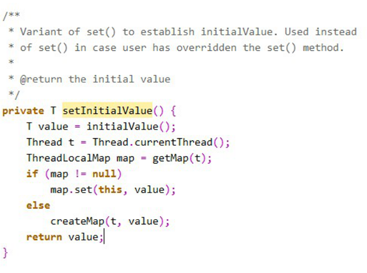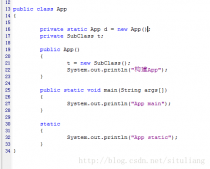一.对threadlocal的理解
threadlocal,很多地方叫做线程本地变量,也有些地方叫做线程本地存储,其实意思差不多。可能很多朋友都知道threadlocal为变量在每个线程中都创建了一个副本,那么每个线程可以访问自己内部的副本变量。
这句话从字面上看起来很容易理解,但是真正理解并不是那么容易。
我们还是先来看一个例子:
|
1
2
3
4
5
6
7
8
9
10
11
12
13
14
15
16
|
class connectionmanager { private static connection connect = null; public static connection openconnection() { if(connect == null){ connect = drivermanager.getconnection(); } return connect; } public static void closeconnection() { if(connect!=null) connect.close(); }} |
假设有这样一个数据库链接管理类,这段代码在单线程中使用是没有任何问题的,但是如果在多线程中使用呢?很显然,在多线程中使用会存在线程安全问题:
第一,这里面的2个方法都没有进行同步,很可能在openconnection方法中会多次创建connect;
第二,由于connect是共享变量,那么必然在调用connect的地方需要使用到同步来保障线程安全,因为很可能一个线程在使用connect进行数据库操作,而另外一个线程调用closeconnection关闭链接。
所以出于线程安全的考虑,必须将这段代码的两个方法进行同步处理,并且在调用connect的地方需要进行同步处理。
这样将会大大影响程序执行效率,因为一个线程在使用connect进行数据库操作的时候,其他线程只有等待。
那么大家来仔细分析一下这个问题,这地方到底需不需要将connect变量进行共享?事实上,是不需要的。假如每个线程中都有一个connect变量,各个线程之间对connect变量的访问实际上是没有依赖关系的,即一个线程不需要关心其他线程是否对这个connect进行了修改的。
到这里,可能会有朋友想到,既然不需要在线程之间共享这个变量,可以直接这样处理,在每个需要使用数据库连接的方法中具体使用时才创建数据库链接,然后在方法调用完毕再释放这个连接。比如下面这样:
|
1
2
3
4
5
6
7
8
9
10
11
12
13
14
15
16
17
18
19
20
21
22
23
24
25
26
27
28
|
class connectionmanager { private connection connect = null; public connection openconnection() { if(connect == null){ connect = drivermanager.getconnection(); } return connect; } public void closeconnection() { if(connect!=null) connect.close(); }} class dao{ public void insert() { connectionmanager connectionmanager = new connectionmanager(); connection connection = connectionmanager.openconnection(); //使用connection进行操作 connectionmanager.closeconnection(); }} |
这样处理确实也没有任何问题,由于每次都是在方法内部创建的连接,那么线程之间自然不存在线程安全问题。但是这样会有一个致命的影响:导致服务器压力非常大,并且严重影响程序执行性能。由于在方法中需要频繁地开启和关闭数据库连接,这样不尽严重影响程序执行效率,还可能导致服务器压力巨大。
那么这种情况下使用threadlocal是再适合不过的了,因为threadlocal在每个线程中对该变量会创建一个副本,即每个线程内部都会有一个该变量,且在线程内部任何地方都可以使用,线程之间互不影响,这样一来就不存在线程安全问题,也不会严重影响程序执行性能。
但是要注意,虽然threadlocal能够解决上面说的问题,但是由于在每个线程中都创建了副本,所以要考虑它对资源的消耗,比如内存的占用会比不使用threadlocal要大。
二.深入解析threadlocal类
在上面谈到了对threadlocal的一些理解,那我们下面来看一下具体threadlocal是如何实现的。
先了解一下threadlocal类提供的几个方法:
|
1
2
3
4
|
public t get() { }public void set(t value) { }public void remove() { }protected t initialvalue() { } |
get()方法是用来获取threadlocal在当前线程中保存的变量副本,set()用来设置当前线程中变量的副本,remove()用来移除当前线程中变量的副本,initialvalue()是一个protected方法,一般是用来在使用时进行重写的,它是一个延迟加载方法,下面会详细说明。
首先我们来看一下threadlocal类是如何为每个线程创建一个变量的副本的。
先看下get方法的实现:

第一句是取得当前线程,然后通过getmap(t)方法获取到一个map,map的类型为threadlocalmap。然后接着下面获取到<key,value>键值对,注意这里获取键值对传进去的是 this,而不是当前线程t。
如果获取成功,则返回value值。
如果map为空,则调用setinitialvalue方法返回value。
我们上面的每一句来仔细分析:
首先看一下getmap方法中做了什么:

可能大家没有想到的是,在getmap中,是调用当期线程t,返回当前线程t中的一个成员变量threadlocals。
那么我们继续取thread类中取看一下成员变量threadlocals是什么:

实际上就是一个threadlocalmap,这个类型是threadlocal类的一个内部类,我们继续取看threadlocalmap的实现:

可以看到threadlocalmap的entry继承了weakreference,并且使用threadlocal作为键值。
然后再继续看setinitialvalue方法的具体实现:

很容易了解,就是如果map不为空,就设置键值对,为空,再创建map,看一下createmap的实现:

至此,可能大部分朋友已经明白了threadlocal是如何为每个线程创建变量的副本的:
首先,在每个线程thread内部有一个threadlocal.threadlocalmap类型的成员变量threadlocals,这个threadlocals就是用来存储实际的变量副本的,键值为当前threadlocal变量,value为变量副本(即t类型的变量)。
初始时,在thread里面,threadlocals为空,当通过threadlocal变量调用get()方法或者set()方法,就会对thread类中的threadlocals进行初始化,并且以当前threadlocal变量为键值,以threadlocal要保存的副本变量为value,存到threadlocals。
然后在当前线程里面,如果要使用副本变量,就可以通过get方法在threadlocals里面查找。
下面通过一个例子来证明通过threadlocal能达到在每个线程中创建变量副本的效果:
|
1
2
3
4
5
6
7
8
9
10
11
12
13
14
15
16
17
18
19
20
21
22
23
24
25
26
27
28
29
30
31
32
33
34
35
36
37
38
39
40
41
|
public class test { threadlocal<long> longlocal = new threadlocal<long>(); threadlocal<string> stringlocal = new threadlocal<string>(); public void set() { longlocal.set(thread.currentthread().getid()); stringlocal.set(thread.currentthread().getname()); } public long getlong() { return longlocal.get(); } public string getstring() { return stringlocal.get(); } public static void main(string[] args) throws interruptedexception { final test test = new test(); test.set(); system.out.println(test.getlong()); system.out.println(test.getstring()); thread thread1 = new thread(){ public void run() { test.set(); system.out.println(test.getlong()); system.out.println(test.getstring()); }; }; thread1.start(); thread1.join(); system.out.println(test.getlong()); system.out.println(test.getstring()); }} |
这段代码的输出结果为:

从这段代码的输出结果可以看出,在main线程中和thread1线程中,longlocal保存的副本值和stringlocal保存的副本值都不一样。最后一次在main线程再次打印副本值是为了证明在main线程中和thread1线程中的副本值确实是不同的。
总结一下:
1)实际的通过threadlocal创建的副本是存储在每个线程自己的threadlocals中的;
2)为何threadlocals的类型threadlocalmap的键值为threadlocal对象,因为每个线程中可有多个threadlocal变量,就像上面代码中的longlocal和stringlocal;
3)在进行get之前,必须先set,否则会报空指针异常;
如果想在get之前不需要调用set就能正常访问的话,必须重写initialvalue()方法。
因为在上面的代码分析过程中,我们发现如果没有先set的话,即在map中查找不到对应的存储,则会通过调用setinitialvalue方法返回i,而在setinitialvalue方法中,有一个语句是t value = initialvalue(), 而默认情况下,initialvalue方法返回的是null。

看下面这个例子:
|
1
2
3
4
5
6
7
8
9
10
11
12
13
14
15
16
17
18
19
20
21
22
23
24
25
26
27
28
29
30
31
32
33
34
35
36
37
|
public class test { threadlocal<long> longlocal = new threadlocal<long>(); threadlocal<string> stringlocal = new threadlocal<string>(); public void set() { longlocal.set(thread.currentthread().getid()); stringlocal.set(thread.currentthread().getname()); } public long getlong() { return longlocal.get(); } public string getstring() { return stringlocal.get(); } public static void main(string[] args) throws interruptedexception { final test test = new test(); system.out.println(test.getlong()); system.out.println(test.getstring()); thread thread1 = new thread(){ public void run() { test.set(); system.out.println(test.getlong()); system.out.println(test.getstring()); }; }; thread1.start(); thread1.join(); system.out.println(test.getlong()); system.out.println(test.getstring()); }} |
在main线程中,没有先set,直接get的话,运行时会报空指针异常。
但是如果改成下面这段代码,即重写了initialvalue方法:
|
1
2
3
4
5
6
7
8
9
10
11
12
13
14
15
16
17
18
19
20
21
22
23
24
25
26
27
28
29
30
31
32
33
34
35
36
37
38
39
40
41
42
43
44
45
46
47
48
|
public class test { threadlocal<long> longlocal = new threadlocal<long>(){ protected long initialvalue() { return thread.currentthread().getid(); }; }; threadlocal<string> stringlocal = new threadlocal<string>(){; protected string initialvalue() { return thread.currentthread().getname(); }; }; public void set() { longlocal.set(thread.currentthread().getid()); stringlocal.set(thread.currentthread().getname()); } public long getlong() { return longlocal.get(); } public string getstring() { return stringlocal.get(); } public static void main(string[] args) throws interruptedexception { final test test = new test(); test.set(); system.out.println(test.getlong()); system.out.println(test.getstring()); thread thread1 = new thread(){ public void run() { test.set(); system.out.println(test.getlong()); system.out.println(test.getstring()); }; }; thread1.start(); thread1.join(); system.out.println(test.getlong()); system.out.println(test.getstring()); }} |
就可以直接不用先set而直接调用get了。
三.threadlocal的应用场景
最常见的threadlocal使用场景为 用来解决 数据库连接、session管理等。
如:
|
1
2
3
4
5
6
7
8
9
10
|
private static threadlocal<connection> connectionholder= new threadlocal<connection>() {public connection initialvalue() { return drivermanager.getconnection(db_url);}}; public static connection getconnection() {return connectionholder.get();} |
|
1
2
3
4
5
6
7
8
9
10
11
12
13
14
|
private static final threadlocal threadsession = new threadlocal(); public static session getsession() throws infrastructureexception { session s = (session) threadsession.get(); try { if (s == null) { s = getsessionfactory().opensession(); threadsession.set(s); } } catch (hibernateexception ex) { throw new infrastructureexception(ex); } return s;} |












